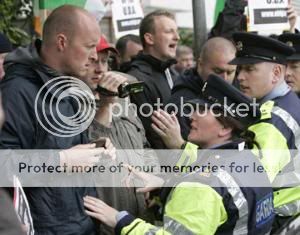éirígí Sligeach activist Gerry Casey has slammed the harassment and intimidation of éirígí activists in Cork by Gardai during the recent Windsor visit as "shameful". He said it was indicative of the political nature of the twenty six county police force and their contempt for the right to protest and the right to enagage in legitimate political activity.

Casey was speaking in the wake of the attendance by the commander-in-chief of Britain’s armed forces, Elizabeth Windsor at events in Cork on the final day of her visit to the twenty six county. state Despite the media fanfare and a massive security operation, socialist republicans from across Cork were to the fore in opposing the presence of the figurehead of British imperialism.
Hundreds of posters and stickers were erected throughout the city centre and over 3,000 leaflets were distributed to households in areas such as Gurranabraher, Knocknaheeny, Mayfield and Togher.
However, in a repeat of the harassment of local activists during the May Day march by political police in the city, éirígí activists were subjected to a sustained campaign of surveillance, detention, stop-and-searches and the theft of legitimate political materials such as leaflets and banners.
Perhaps the most serious incident in this campaign of harassment took place on May 19, when éirígí members were again detained soon after erecting a banner stating Fund Communities not Royal Visits.
The activists were held in a petrol station forecourt for almost an hour by no less than 18 Gardaí, including members of the Armed Response Unit and a plethora of Special Branch secret police.
During this detention, personal items such as mobile phones and cameras were seized and private contents such as text messages and photographs were read and recorded.
The vehicle in which the activists were travelling was also subject to an invasive search, while banners and other materials were confiscated by a detective, who preposterously cited “incitement to hatred” legislation.
The fact that the Special Branch view a call to fund deprived communities in Cork ahead of fêting a foreign monarch as “incitement to hatred” speaks volumes about the mentality of this particular police force.
Condemning this behaviour Casey said: "This is political policing at its worst. The sole purpose of Garda actions had nothing to do with 'security' or 'public order' but with preventing peaceful protest and stifling opposition to the Windsor visit. Just as with the Gardai's behaviour in Dublin, their colleagues in Cork showed that they would not be outdone in their attempts to harass and intimidate political activists engaged in legitimate peaceful activity."
"These actions, including the theft of political material, in Dublin and Cork were not the actions of over-zealous or rogue cops. This was a deliberate policy implemented from the top down within the Gardai, obviously on the orders of their political masters."
Casey concluded: "A decision was taken to try to stop or at least to minimise the protests and to deter the public from joining the protests where they did occur. They also were obviously given the green light to use whatever means necessary to do so. This included the systematic breaking of their own laws by the use of illegal stop and searches and the theft and destruction of banners, posters and other political materials."
However, éirígí activists in Cork City have pledged their determination to continue promoting the politics of socialist republicanism and will not be deterred in their efforts by petty attempts at bullying or harassment by the political police.
Tweet
Tweet



No comments:
Post a Comment